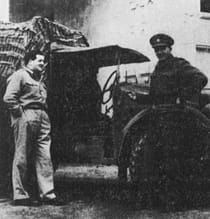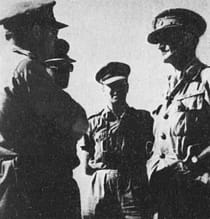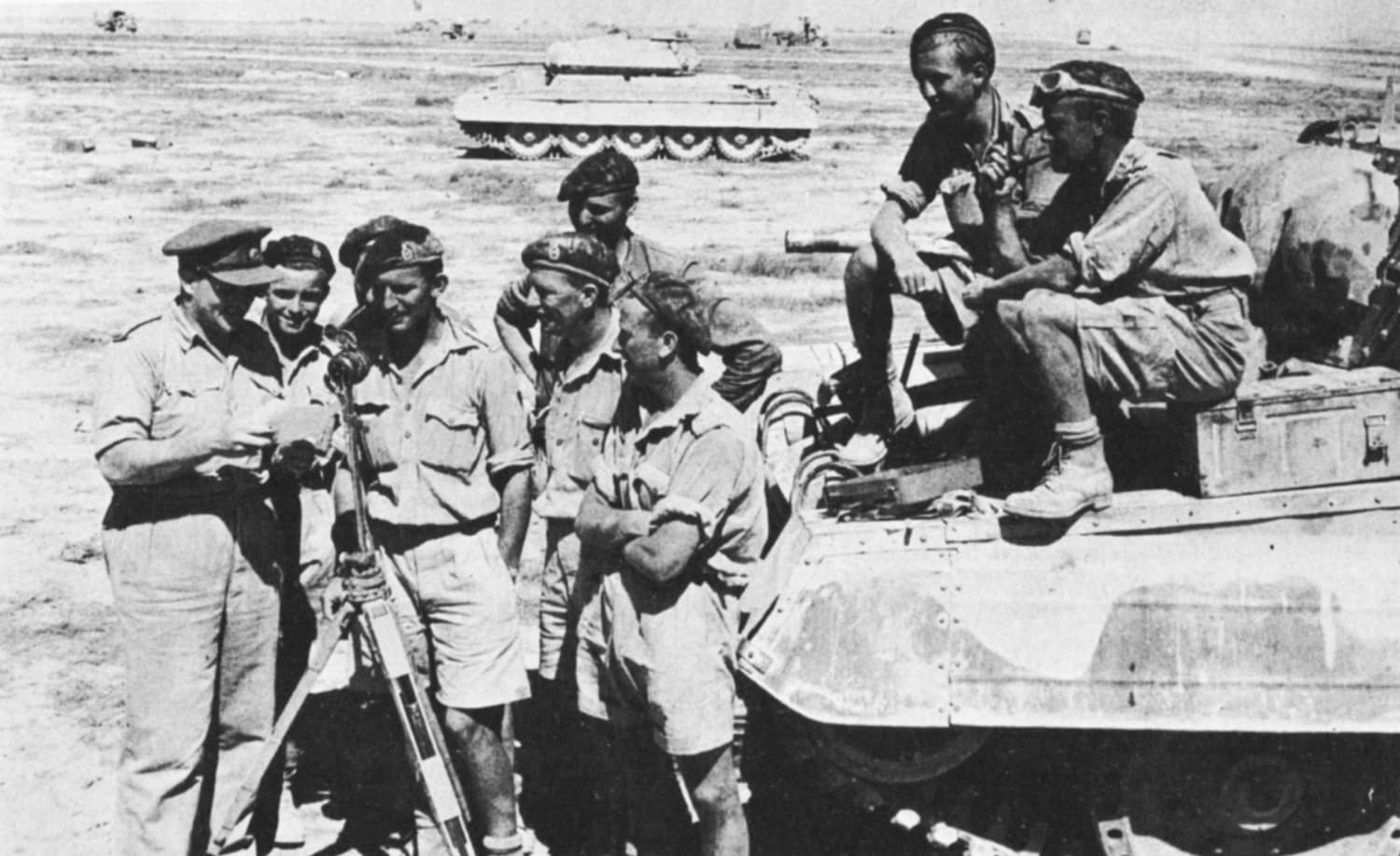Richard Dimbleby himself described his Middle Eastern adventures in detail in that very readable book ‘The Frontiers Are Green’ published by Hodder and Stoughton. It is now out of print but available in libraries. This extract gives a sample of its flavour, and also of Dimbleby’s continuing interest in surgery:

One night when the Germans were pressing forward and our tanks, guns, and infantry were falling quickly but methodically back, I was in a casualty clearing station. The battle was not far away; the noise of it penetrated the heavy canvas walls of the hospital tents, and occasionally a heavier or nearer explosion shook the medical fittings laid out in the operating theatre. The casualty station lay in the enemy’s path. A sudden advance would engulf it and the wounded men who sat or lay in its wards. Several field hospitals had been overrun in desert battles; one, an Indian unit, had changed hands three times in a single day. The British doctors did not stop work nor did they have time to do more than glance at the German doctor who was using the spare operating table for his own casualties.

There had been some stiff fighting on the day that I went to the C.C.S., and a queue of thirty men waited outside the tent. It was nearly dark, and on the western horizon flickering lights showed the battle area. Bombers and fighters had been thundering low overhead all day, and at tea-time a Messerschmidt swooping low over the Red Crosses of the hospital had machine-gunned the wards, and missed. The evening lull was spreading over the desert, and the single groan of a wounded man sounded from the ambulance where he lay with his arms broken. I pushed back the blanket at the entrance to the operating theatre and entered the light trap that preserved absolute black-out. The blanket dropped into position behind me and for a moment I stood in the pitch-dark entrance, smelling ether through the second blanket. There was a clinking and rustling inside, and a voice. I lifted the flap and a beam of bright light shot through. In the middle of the tent three men robed in white were standing at a polished steel table. Directly above them a powerful bulb shone against the bright insides of petrol tins, split and flattened round it to reflect the light to the table. A copper steriliser was bubbling and hissing and letting out fussy jets of steam. An orderly in khaki with a gauze pad over his mouth was packing the sterilising drum with dressings. His shirt and shorts were the only touches of khaki; everything else was white and spotless. All except a long enamel dish on the ground which had a dirty leg in it. Someone had thrown a cloth over the leg, leaving the toes sticking up, blue and grubby.
I looked hurriedly away and caught the eye of the surgeon, who raised his gloved hand in greeting. He spoke to the orderly.
‘Right. He’ll do. Keep him warm.’
The casualty was lifted from the table and carried out, breathing stentoriously. The leg was also carried away, I presumed for burning, and the orderly began cleaning up the litter of bloody dressings and instruments. Two bombers roared over the tent. The surgeon, who was washing at a bowl of steaming water, took no notice. He had taken off his mask and I saw his tired, strained face. He smiled across to me.
‘These battles are hell. That’s the fourth amputation today and the fourteenth operation. I’ve been at it since eight o’clock this morning and there’s a queue like Bank Holiday at the cinema. Get a move on Jenkins’ – this to the orderly, who was preparing a clean mask and fresh rubber gloves. As soon as the surgeon was dressed again, the orderly lifted the tent flap and called in the next man. He was a burly tank driver with a field dressing twisted round his neck. He had been bleeding, enough to soak the dressing and stain his shirt. He came forward hesitantly into the bright light.
‘What’s the matter with you?’ asked the doctor.
The man pointed to the bandage. ‘Something went in here, sir.’ He spoke huskily, his words wheezing out as though the sound were indeed escaping through a hole in his neck.
‘Hop up on the table and let’s have a look at it.’
The man stood still.
‘Come on, jump up,’ said the orderly.
The driver hesitated a moment, then spoke to the surgeon. ‘I’d rather not, sir. I’ve read the regulations and I can refuse an operation.’
The surgeon stared at him. The man was weak and exhausted, his face showed clearly the strain of a week’s heavy tank fighting.
‘Then what the hell are you wasting my time for? There are fifty other men waiting outside. If you don’t want treatment, get out of the way.’
The man said, ‘Thank you, sir,’ huskily and turned to go. As he reached the door the doctor called after him: ‘By the way, you’ll be dead in a week.’
The driver went on, and the doctor grinned at me. ‘That always gets ’em. He’ll be back later.’
Two bearers brought in a stretcher and laid it on the table. On it was a black soldier, a ‘boy’ from one of the South African gold mines. A chunk of shell had ripped its way into his back. He was conscious and rolling his eyes.
‘Ever seen a major operation?’ asked the surgeon.
I said no.
‘Well, come up to the table and watch. It’s quite interesting.’
I remembered stories of what happened to medical students when they watched their first operation. I could find no excuse for going outside. I moved up to the table.
The anaesthetist at the man’s head was adjusting the controls of his machine. I tried to look bright and confident. I said to the black boy, ‘You’re all right now. You’ll soon be better.’
He smiled faintly and gave a little groan. Then he said in a very low voice, almost a whisper:
‘My mother – she’ll be crying for me.’ He looked at me once again as the mask was put over his nose. It was the look of a dumb, frightened creature. I wanted to take his hand and say something to comfort him, but it was the anaesthetist who spoke. ‘Breathe,’ he said, bending down to speak in the boy’s ear, ‘breathe.’
The surgeon stood waiting. Presently the South African relaxed. The anaesthetist nodded and the doctor took a shining knife from the orderly. ‘Here goes,’ he said. I held my breath, unable to tear my eyes from the small patch of bare stomach that had been swabbed clean with spirit. For a second the surgeon held the knife poised over the black skin, as though measuring his stroke. Then it flashed. A thin scarlet line appeared in the flesh and a little blood spurted. ‘Swabs,’ said the surgeon, and packed gauze into the opening. Then he cut deeper and dropping the knife into a tray, held out his hand. The orderly put a few tiny clips into it and with these the sides of the wound were pegged back until it was a red mouth in the glistening wall of the stomach.
The man was snoring jerkily, and the anaesthetist held up a hand. The surgeon waited. His colleague listened for a moment and adjusted a silver wheel. He listened again; then nodded.
Somebody was being bombed; each crump shook the tent, and I could hear the anti-aircraft guns coughing. I thought the battle had come nearer. No one else in the tent seemed conscious of its existence. The anaesthetist and orderlies were motionless at their posts. The surgeon had plunged his hand through the hole and was bringing out various innards, placing them on the top of the stomach. I saw them through half-closed eyes; they were not so unpleasant. I thought of the shattered men I had seen in slit trenches and anti-tank positions. This atmosphere of cleanliness and perfect order was more acceptable.
The surgeon had his hand inside the unconscious man’s body. He was feeling and probing with surprising energy, and talking half to himself, half to me. ‘This bit of metal’s got itself in an awkward position. Nothing this side – nothing over there but guts.’
As he explored, I imagined him back in Auckland, New Zealand, where he was one of the best-known surgeons. Now he was working as deftly and with as much concentration as if he were in a hospital at home. Thus he worked on every man brought in, though he was stiff with fatigue. No man did more for the army in the desert than this New Zealand surgeon and the other doctors like him who worked on the battlefield.
The battle continued, and against its drumming and rumbling I listened to the snores of the unconscious South African. I was standing close by the table, remembering how I had once wanted to be a surgeon, when the New Zealander exclaimed ‘Here it is’, and drew from the gently moving stomach a jagged fragment of steel. He looked at it for a moment and then without warning, tossed it across to me. ‘Catch,’ he grinned. I caught it; we always try to catch things thrown unexpectedly, even grisly slivers of metal with blood on them. As soon as I closed my hand on the fragment, I let it drop in disgust. It was warm and slippery. The orderlies thought it a great joke; one of them picked it up, washed it and returned it to me.
The surgeon, having made sure that no other splinters remained inside the South African, was sewing up an intestinal wound, balancing the torn organ on the palm of one hand and stitching away as industriously and as deftly as a woman darning socks.
‘I’m just a cobbler,’ he said. ‘I spend my life sewing up holes in people. It’s a foul job, really.’
‘Will this man recover?’ I asked.
‘Recover? Good God, yes. He’ll be up and about in three weeks and back with his unit in a couple of months. They’re very tough, these black boys, and I’ve made a good job of him. Look, isn’t that pretty?’ He displayed the sausage-like intestine, neatly cross-stitched on one side. Then he pushed the contents of the stomach back to their proper places, juggling with one intestine that kept popping out of the hole. When all was settled, the orderly poured half a bottle of disinfectant straight into the stomach and helped the doctor to sew it up. A dressing was applied and blankets were tucked round the sleeping man. We followed the stretcher bearers out into the cold air and the surgeon came out with us. He had taken off his mask and gloves and outside in the moonlight he wiped his sweating forehead. I offered him a cigarette. ‘No, thanks,’ he said. ‘No time now. Look at that lot.’ He indicated a bedraggled queue of men standing, sitting and lying outside the big tent. At the head of the line was the tank driver who had refused an operation.
‘Hullo,’ said the surgeon, ‘changed your mind?’
‘Yes, sir,’ croaked the driver, fingering his bloody neck. ‘Can you do something for this, sir? It’s beginning to hurt.’
The doctor pointed to the tent. ‘Hop inside and wait for me.’ The man saluted smartly and went through the doorway. ‘They always think better of it,’ said the surgeon. ‘Funny how obstinate they can be. Damned good chaps in battle. Well, I hope you enjoyed yourselves. Good night.’

